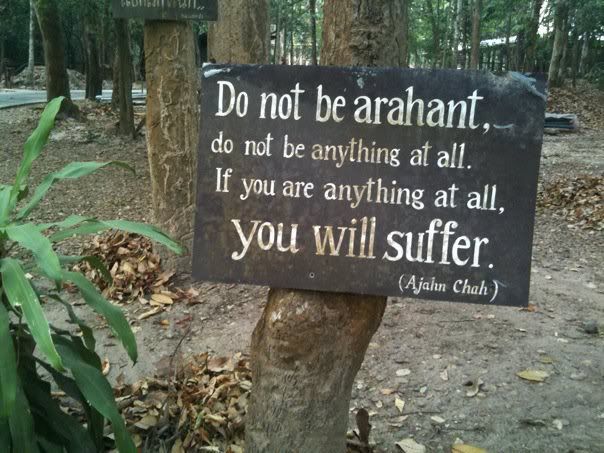DN 14 wrote:‘Now there arose, brethren, in the mind of Vipassī the Bodhisat, when he had gone to his place, and was meditating in seclusion, the following consideration—“Verily this world has fallen upon trouble; one is born, and grows old, and dies, and falls from one state, and springs up in another.”
‘“And from this suffering, moreover, no one knows of any way of escape, even from decay and death. O when shall a way of escape from this suffering be made known, from decay and from death?”
‘Then to Vipassī the Bodhisat, brethren, this occurred—“What now being present, is birth also present; what conditions birth?” Then, brethren, from attention to the cause arose the conviction through reason—“When becoming is, birth also is present; becoming is the condition of birth.”
‘Then to Vipassī the Bodhisat, brethren, this occurred—“What now being present, is becoming also present; what conditions becoming? “Then, brethren, from attention to the cause arose the conviction through reason—“Where grasping is, there is becoming; grasping is the condition of becoming.”
‘Then to Vipassī the Bodhisat, brethren, this occurred—“What now being present, is grasping also present; what conditions grasping? “Then, brethren, from attention to the cause arose the conviction through reason—“Where craving is, there is grasping; craving is the condition of grasping.”
‘Then to Vipassī the Bodhisat, brethren, this occurred—“What now being present, is craving also present; what conditions craving?” Then, brethren, from attention to the cause arose the conviction through reason—“Where feeling is, there is craving; feeling is the condition of craving.”
‘Then to Vipassī the Bodhisat, brethren, this occurred—“What now being present, is feeling also present; what conditions feeling? “Then, brethren, from attention to the cause arose the conviction through reason—“Where contact is, there is feeling; contact is the condition of feeling.”
‘Then to Vipassī the Bodhisat, brethren, this occurred—“What now being present, is the sixfold field also present; what conditions the sixfold field? “Then, brethren, from attention to the cause arose the conviction through reason—“Where name-and-form is, there is the sixfold field; name-and-form is the condition of the sixfold field.”
‘Then to Vipassī the Bodhisat, brethren, this occurred—“What now being present, is name-and-form also present; what conditions name-and-form?”
Then, brethren, from attention to the cause arose the conviction through reason—“Where cognition is there is name-and-form; cognition is the condition of name-and-form.”
‘Then to Vipassī the Bodhisat, brethren, this occurred—“What now being present, is cognition also present; what conditions cognition?’ Then, brethren, from attention to the cause arose the conviction through reason—“Where name-and-form is, there is cognition; name-and-form conditions cognition.”
‘Then to Vipassī the Bodhisat, brethren, this occurred—“Cognition turns back from name-and-form; it goes not beyond. Only as follows can one be born or stow old or die or fall from one condition or reappear in another; that is, in that cognition is conditioned by name-and-form, and name-and-form by cognition, the sixfold field by name-and-form, contact by the sixfold field, feeling by contact, craving by feeling, grasping by craving, becoming by grasping, birth by becoming, decay and dying by birth, and so too grief, lamentation, ill, sorrow and despair come to pass. Such is the coming to be of this entire body of Ill.”
‘“Coming to be, coming to be!”—at that thought, brethren, there arose to Vipassī the Bodhisat a vision into things not called before to mind, and knowledge arose, reason arose, wisdom arose, light arose.
‘Then to Vipassī the Bodhisat, brethren, this occurred—“What now being absent, is decay and dying also absent; by the ceasing of what does decay and dying cease?” Then, brethren, from attention to the cause arose the conviction through reason—“Where birth is absent, decay and dying are absent; when birth ceases, decay and dying cease … Where becoming is absent, birth is absent; when becoming-ceases, birth ceases … Where grasping is absent, becoming is absent; when grasping ceases, becoming ceases … Where craving is absent, grasping is absent; when craving ceases, grasping ceases … Where feeling is absent, craving is absent; when feeling ceases, craving ceases … Where contact is absent, feeling is absent; when contact ceases, feeling ceases … Where the sixfold field is absent, contact is absent; when the sixfold field ceases, contact ceases … Where name-and-form is absent, the sixfold field is absent; when name-and-form ceases, the sixfold field ceases … Where cognition is absent, name-and-form is absent; when cognition ceases, name-and-form ceases … Where name-and-form is absent, cognition is absent; when name-and-form ceases, cognition ceases.”
Paul.
